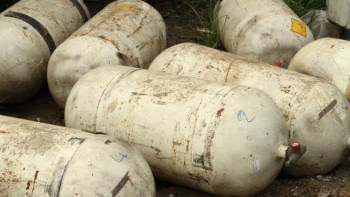Old Dhaka exposed to chemical hazards

Seven years after the deadly chemical fire claiming 124 lives in Nimtoli, parts of densely-populated Old Dhaka still have extremely hazardous stocks of flammable chemicals without any safety measures whatsoever.
“The highly flammable chemicals are stocked and handled in such an unsafe way that any of them may erupt like a volcano anytime, leading to huge fire and devastation,” said Major AKM Shakil Newaz, director of Fire Service and Civil Defence.
All of the surveyed 360 stores, warehouses, factories and shops with the chemicals were found highly hazardous in terms of fire safety, handling of the chemicals and explosion management, according to the findings of a recent fire inspection.
For example, Shakil said, Acetone, a highly flammable chemical, is supposed to be preserved under 23 degrees Celsius for avoiding any explosion. However, it was found left under the sun, exposing it to around 36 degrees Celsius.
All the stores and shops were found lacking even the basic fire safety equipment, like extinguishers, let alone a complete fire fighting system.
The only way to avoid the danger is to relocate them immediately, he said.

The chemical stocks have been surveyed in different areas of Lalbagh, Bangshal, Armanitola, Moulavibazar, Imamganj, Islambagh, Shahidnagar, Kamrangirchar, Chalkbazar, Mitford and Babubazar.
The Dhaka South City Corporation along with the fire department was all set to launch an eviction drive yesterday. However, it had to be postponed due lack of police support, said DSCC sources.
The law enforcers were busy dealing with road transport workers who were enforcing a countrywide strike.
Shakil said, “Those [chemical stocks] are deadly for human lives. Those are kept in such a way that even a spark can cause an inferno in the blink of an eye”.
Following the devastating Nimtoli tragedy in June 2010, the commerce ministry was supposed to build a “chemical village” in Keraniganj, after acquiring land, building the physical structure and ensuring safety, for relocation of the chemical stores from the residential areas.
The village is not ready yet.

Of the 62 chemicals surveyed, 22, including Acetone, are extremely flammable, he said, adding that the chemicals are handled everyday without any personal safety gears, safety instructions and more dangerously without controlling the temperature.
Explosive and noncorrosive liquid and powder chemical substances are all piled up, not separately, he said.
Asked, the fire official said his department did not issue any safety licence for dealing with hazardous chemicals in the residential areas of Old Dhaka.

However, those handing the chemicals might have city corporation trade licences. Sometimes, the explosives department too issue licences without coordinating with the fire department, he said.
“We had given them a 15-February deadline for relocation,” he said, “Now with the deadline over, we along with the city corporation are going for the eviction drive,” he told this newspaper before the drive was postponed.
According to the survey findings, the chemicals are stored and handled without the basic safety practice, equipment, fire fighting system. The residential areas are chocked with narrow inaccessible roads lacking natural water reservoirs for fire fighting.
Handling the chemicals with bare hands causes damage to the limbs, respiratory tracts, skin, eyes, liver, kidney and heart.
Contacted, Chief Inspector of the Department of Explosives, Shamsul Alam, said, “There is no valid licence for dealing with hazardous chemicals in the residential areas”.
On the legal actions taken by them against the unauthorised chemical business, he said district administration, police, city corporation and the fire department occasionally conduct mobile court drives which seize illegal chemicals and detain people involved in storing and selling them.
“We cannot initiate such drives ourselves due to lack of manpower,” he said, adding that their Dhaka head office has only three inspectors, including him.
He said they issue licence for dealing with highly explosive chemicals only in large volume and only upon clearance from the fire department and the district administration.
Currently, there are only around 200 valid licences issued for the city's outskirts, including around 40 for the Keraniganj “chemical village”.
Though the Keraniganj village has not been developed by the government yet, around 40 traders have moved there from the residential areas in Old Dhaka on their own, Shamsul added.


 For all latest news, follow The Daily Star's Google News channel.
For all latest news, follow The Daily Star's Google News channel. 



Comments